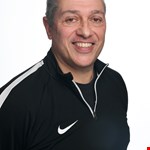
Dr Richard Godfrey - Richard is a Senior Lecturer in Sports Coaching and Human Performance but is a physiologist by background. He lectures at every level in physiology and at level 2, 3 and Masters in Sports Coaching. The bulk of Richard’s research is in the area of human growth hormone and specifically the exercise-induced growth hormone response. He completed his PhD on ‘The exercise-induced growth hormone response in humans and its association with lactate’ in 2003 with Cranfield University. He has published on the physiology of naturally occurring growth hormone and on the consequences of injecting growth hormone in athletes. His interests extend to sports performance and increasingly to health-related aspects of exercise. As a result he has published on a wide range of issues other than growth hormone; on heat, hydration and performance, jet lag, bone health, physiology of rowing, altitude, physiology of exercise training, physiology of triathlon, detraining, cancer and exercise, sleep, immune function and education. In 2003 Richard joined the teaching team in the School of Sport and Education (now College of Health and Life Sciences) following 12 years as a physiologist at the British Olympic Medical Centre (BOMC), the British Olympic Association’s Department of Science and Medicine. During the last 7 years with the BOA he was Chief Physiologist of the BOMC and was involved in organising physiology service provision to elite sport before the home-country sports institutes, including the English Institute of Sport, were operational. During his time with the BOA Richard staffed more than 100 training camps, many abroad and in extreme environments ranging from –30oC in the Canadian Rockies to 47oC in Seville and at altitudes up to 2800m on glaciers in France and Norway. This has provided him with a rich and unique catalogue of experiences which can perhaps best be illustrated in taking blood for lactate analysis. From blood sampling from rowers whilst hanging over the edge of a speedboat on the Thames or on a lake in Italy, to near blizzard conditions, in the dark, with cross-country skiers, on a mountain in Sweden. He has accompanied and supported various British sports teams at training camps and in their final preparations for European and World Championships as well as for Olympic Games. This, either as a scientist in isolation, or as part of a team of staff which may include a doctor, physiotherapist, nutritionist and psychologist. In 1996 he was the Physiologist to the British Olympic Team in Atlanta where heat and humidity were the greatest concerns. In 2002 he was Physiologist / Assistant Coach to the Biathlon Team that competed at the Olympic Winter Games in Salt Lake City, where cold and altitude posed a threat to well-being and to performance. Richard has appeared in the press, and on radio and TV, on more than 40 occasions and has more than 100 publications including peer-reviewed papers, book chapters and articles for the lay press. His interest in science has led to invited presentations at conferences for the British Association of Sport and Exercise Sciences, the English Institute of Sport, the British Association for the Advancement of Science and the Association for Science Education. In 2000 he gave an invited talk at Oxford University for their part in Science, Engineering and Technology Week. Richard has been a Fellow of the American College of Sports Medicine (ACSM) since 2005 and was made a Fellow of the British Association of Sport and Exercise Sciences (BASES) in September 2010.